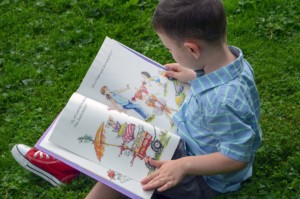May is an opportunity to focus on Stuttering Awareness Week, a complex disorder that affects 70 million people worldwide. The fact is, children who stutter are bullied around 4 times more than children who don’t.
 “Actions speak so much louder than words,” said Jane Fraser, president of the Stuttering Foundation. “This year, the focus of our effort to celebrate Stuttering Awareness Week is to spotlight helpful activities everyone can do for the people who stutter in their lives. One in five children stutters for at least a short period of time, and one in 100 adults struggles with fluency on a regular basis. Most people know someone – a family member, a friend, a coworker or a classmate – who stutters.”
“Actions speak so much louder than words,” said Jane Fraser, president of the Stuttering Foundation. “This year, the focus of our effort to celebrate Stuttering Awareness Week is to spotlight helpful activities everyone can do for the people who stutter in their lives. One in five children stutters for at least a short period of time, and one in 100 adults struggles with fluency on a regular basis. Most people know someone – a family member, a friend, a coworker or a classmate – who stutters.”
Causes of Stuttering
Stuttering typically starts between the ages of 2 and 6. While many children experience some type of disfluency as they are learning to speak, but if it continues more than a couple of months, a speech language pathologist (SLP). Possible causes of stuttering include family history and brain differences.
When Should You Seek Help For Your Child?
According to the American Speech-Language-Hearing Association, “If you think your child stutters, get help from an SLP as early as possible. Early help can reduce the chances that your child will keep stuttering.”
Contact an SLP if any of the following things happen:
- Your child’s stuttering has lasted for 6–12 months or more.
- Your child starts to stutter late (after 3½ years old).
- Your child starts to stutter more often.
- Your child tenses up or struggles when talking.
- Your child avoids talking or says it is too hard to talk.
- There is a family history of stuttering.
The SLP will also test your child’s speech and language. This includes how your child says sounds and words, how well they understand what others say, and how well they use words to talk about their thoughts.
Listeners can help those who stutter by:
Refrain from suggesting the child to “take a breath” or “relax”
Try not to guess what the child is trying to say
Listen patiently without expressing any time pressure
Keep normal eye contact
 Great books about stuttering for children
Great books about stuttering for children
Steggie’s Sturrer, written by Jack Hughes Friends of Steggie learn the value of their friend who stutters.
Stuttering Stan Takes a Stand Written by Artie Knapp When Stan the Squirrel is teased for his stuttering, he finds out he is not the only one with insecurities. Kindness brings everyone together.
Ben Has Something to Say, written by Laurie Lears An inspiring story about a boy who is hesitant to speak because he stutters. Until he discovers just how important what he has to say is.


